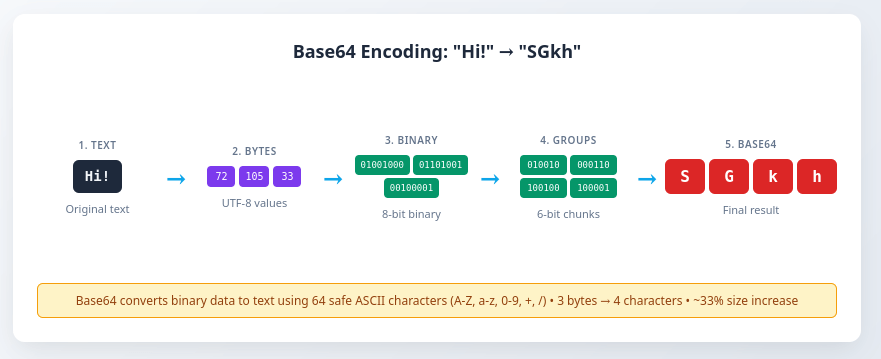Base64 Encoder & Decoder Tool
Easily encode text to Base64 or decode Base64 strings back to readable text. Base64 is a binary-to-text encoding scheme commonly used to encode binary data for transmission over text-based protocols like email and HTTP.
Operation Mode
Input Text
Base64 Result
Enter text to see Base64 conversion
Conversion Statistics
Quick Examples
About Base64 Encoding
Base64 is a way to encode binary data into text using only 64 printable ASCII characters. It's commonly used for transmitting data over text-based protocols.
Common Uses:
- • Email attachments (MIME)
- • Data URLs in web pages
- • API authentication headers
- • Storing binary data in JSON/XML
Important Notes:
- • Not encryption - easily reversible
- • Increases size by ~33%
- • Safe for text transmission
- • Supports all Unicode characters
What is Base64 Encoding?
Base64 is a binary-to-text encoding scheme that represents binary data in an ASCII string format. It's designed to carry data stored in binary formats across channels that are designed to deal with textual data reliably.
Key characteristics of Base64:
- 64 characters: A-Z, a-z, 0-9, +, /
- Padding: Uses '=' for padding
- Safe transmission: ASCII-safe encoding
- Reversible: Can be decoded back to original
Example: "Hello World" becomes "SGVsbG8gV29ybGQ="

Features of Our Base64 Tool:
- Instant conversion - Real-time encoding/decoding as you type
- Unicode support - Handles all UTF-8 characters correctly
- Error detection - Identifies invalid Base64 strings
- Character statistics - Shows input/output length and size change
- Safe processing - All operations performed in your browser
- Copy functionality - Easy copying of results
- Bidirectional - Encode and decode in the same tool
- Mobile responsive - Works on all devices
How to Use the Base64 Tool
1. Choose Operation
Select "Encode" to convert plain text to Base64, or "Decode" to convert Base64 back to readable text.
2. Enter Your Data
Type or paste your text in the input field. The conversion happens automatically in real-time.
3. Copy Results
Use the copy button to copy the converted text to your clipboard for use in other applications.
Practical Examples of Base64
| Original Text | Base64 Encoded |
|---|---|
| Hello World | SGVsbG8gV29ybGQ= |
| Base64 Example | QmFzZTY0IEV4YW1wbGU= |
| 123456789 | MTIzNDU2Nzg5 |
| [email protected] | dXNlckBleGFtcGxlLmNvbQ== |
Common Uses for Base64
Base64 encoding is widely used in various applications:
- Email attachments - MIME encoding for binary files
- Data URLs - Embedding images directly in CSS/HTML
- API authentication - Basic Auth headers
- Web development - Encoding data for transmission
- Configuration files - Storing binary data in text files
- Database storage - Storing binary data in text fields
- JSON data - Including binary data in JSON
- URL parameters - Safe transmission of data in URLs
How Base64 Encoding Works
Base64 encoding works by converting binary data into a text representation using 64 printable ASCII characters:
Base64 Character Set
Encoding Process
- Convert text to binary representation (UTF-8)
- Group binary data into 6-bit chunks
- Map each 6-bit value to a Base64 character
- Add padding characters (=) if needed
Base64 vs. Other Encodings
| Encoding | Characters | Use Case | Size Increase |
|---|---|---|---|
| Base64 | A-Z, a-z, 0-9, +, / | General purpose | ~33% |
| Base64URL | A-Z, a-z, 0-9, -, _ | URL-safe | ~33% |
| Hexadecimal | 0-9, A-F | Binary data | 100% |
| URL Encoding | %, hex values | URL parameters | Variable |
Related Encoding Tools
Explore these related encoding and decoding tools:
URL Encoder/Decoder
Encode and decode URL parameters and query strings for safe web transmission.
Try our URL Encoder tool →HTML Entity Encoder
Convert special characters to HTML entities for safe display in web pages.
Try our HTML Encoder tool →Frequently Asked Questions
Is Base64 encryption?
No, Base64 is encoding, not encryption. It's easily reversible and provides no security. It's designed for safe data transmission, not data protection.
Why does Base64 make data larger?
Base64 increases data size by approximately 33% because it represents 3 bytes of binary data with 4 ASCII characters.
Can Base64 handle any text?
Yes, our tool supports Unicode (UTF-8) text, so it can encode any characters including emojis, accented letters, and non-Latin scripts.
What's the difference between Base64 and Base64URL?
Base64URL is a URL-safe variant that replaces '+' with '-' and '/' with '_', and omits padding '=' characters to make it safe for URLs.
Why do I get an error when decoding?
Decoding errors occur when the input isn't valid Base64. Check for missing characters, invalid characters, or incorrect padding.
Technical Implementation Details
Our Base64 tool uses the browser's built-in functions for reliable encoding and decoding:
This approach ensures:
- Proper UTF-8 character handling
- Standards-compliant Base64 output
- Browser compatibility across all modern browsers
- Reliable error detection for invalid input